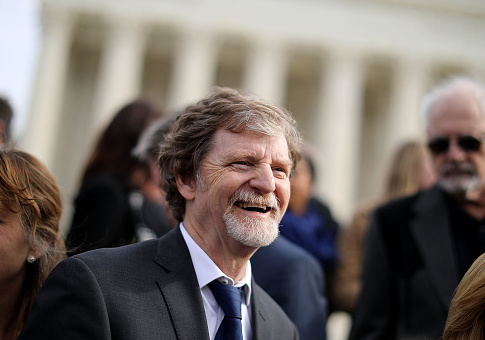The Supreme Court's landmark decision to protect the conscience rights of a baker who declined to participate in a gay marriage won plaudits from religious liberty advocates.
On Monday, the Supreme Court ruled 7-2 that Colorado regulators unconstitutionally violated the First Amendment rights of Masterpiece Cakeshop when it sanctioned the bakery for refusing to make a cake celebrating a gay wedding even as it offered to sell other goods to the couple. The Court ruled that state regulators demonstrated open hostility to religious beliefs and violated the baker's freedoms of expression and religion.
"The laws and the Constitution can, and in some instances must, protect gay persons and gay couples in the exercise of their civil rights, but religious and philosophical objections to gay marriage are protected views and in some instances protected forms of expression," the ruling said. "The Commission's treatment of Phillips' case violated the State's duty under the First Amendment not to base laws or regulations on hostility to a religion or religious viewpoint."
Religious groups and First Amendment advocates welcomed the ruling, saying it struck a blow for liberty and pluralism. They say the Court was correct in protecting the sincere beliefs of religious business owners. The Alliance Defending Freedom, which represented Masterpiece Cakeshop, said in a statement that business owner Jack Phillips "serves all customers; he simply declines to express messages or celebrate events that violate his deeply held beliefs."
"Government hostility toward people of faith has no place in our society, yet the state of Colorado was openly antagonistic toward Jack's religious beliefs about marriage," ADF said. "The Court was right to condemn that. Tolerance and respect for good-faith differences of opinion are essential in a society like ours. This decision makes clear that the government must respect Jack's beliefs about marriage."
Gay advocates downplayed the impact of the ruling, saying it was narrow in scope. The Human Rights Campaign said advocates of religious liberty are using the case to pursue discrimination rather than freedom of expression.
"Anti-LGBTQ extremists did not win the sweeping 'license to discriminate' they have been hoping for—and today's ruling does not change our nation's longstanding civil rights laws," it said in a release.
The conflict between gay advocacy groups and religious organizations will not go away, according to Terry Schilling, executive director of the American Principles Project. He said the rapid change of America's approach to marriage and family formation will invite future conflicts. He pointed to the discrimination complaints in multiple states, some of which were filed after couples had easily found other bakers to make their cake, as evidence of the LGBT's lobby to reject pluralism.
"America has a major task in refereeing a consistent and growing conflict between balancing the rights of LGBT persons with the rights of religious Americans. Progressives have sought to suppress any views that differ from an activist LGBT agenda, while steamrolling fundamental human rights like the freedom of religion, the freedom of speech, and the freedom of association," he said. "The Supreme Court ruling is a significant first step in pushing back on that progressive effort and preserving an America all can live out their faith in the public square without fear of government persecution."
Dr. Grazie Christie, an adviser to the Catholic Association, said regulators had overstepped their bounds in attempting to punish religious believers for affirming an approach to marriage that had been adopted by most of society until 2015. The decision, he said in a statement, "rebuked a government that rides roughshod over the religious scruples of its citizens."
"To attempt to bully cake-baker Jack Phillips to create a work of art in violation of his sincerely held religious beliefs was an act of hostility from the state, picking sides when it should have remained neutral," Christie said. "The state's insistence on its right to force the baking of cakes, taking the case all the way to the Supreme Court, was an act of persecution born of religious intolerance, unworthy of our great nation."
The decision could play a role in other religious liberty cases stemming from the Supreme Court's 2015 Obergefell ruling, which overturned all state laws defining marriage as being between a man and woman. An Oregon couple was also targeted by a state agency for discrimination charges because they refused to participate in a gay wedding. Ben Bull, executive director of advocacy for First Liberty Institute, which represents the couple, said it hopes the Masterpiece decision will aid their legal battle.
"The Supreme Court's decision today is a victory for every American who believes in religious freedom," Bull said in a statement. "Our clients, bakers Aaron and Melissa Klein from Oregon, have also been targeted because of their religious beliefs, and are encouraged by this victory and how it may impact their ongoing case."
